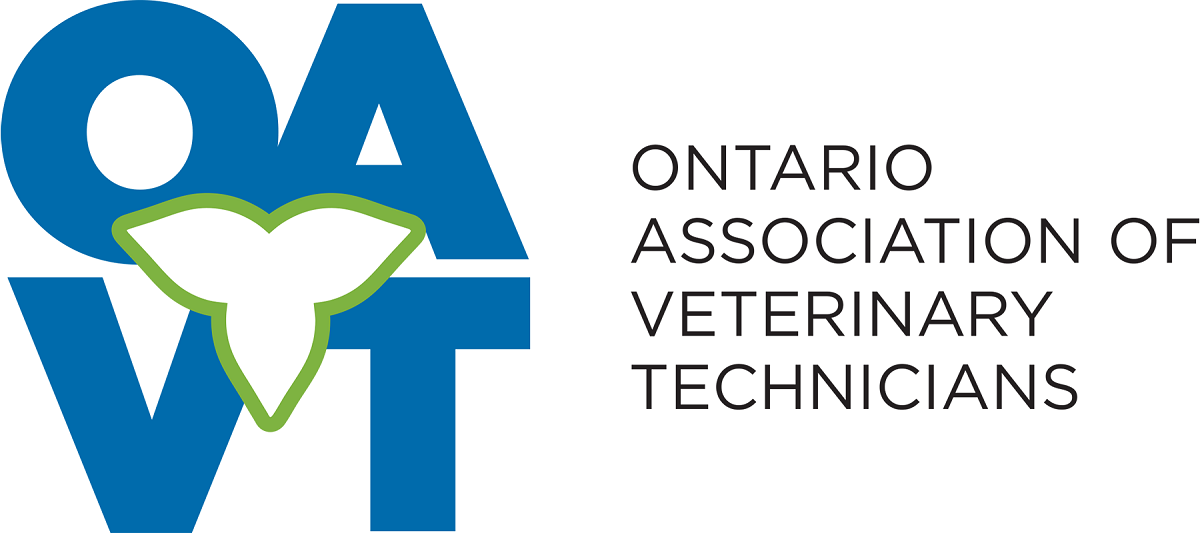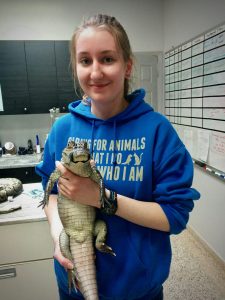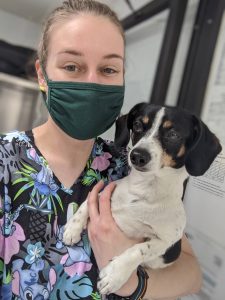Emma Neukom, RVT
Where did you go to school and what made you decide to take a Veterinary Technology program?
I attended the Veterinary Technician program at St. Lawrence College, the only 3-year program that specializes in lab animal medicine. I always knew from a young age that I wanted to work with animals and it was a calling of mine. Originally, I thought I wanted to become a veterinarian because I had no idea that being an RVT was even an option. I remember being in high school and having a “bring your kid to work day” but my parents didn’t work in the veterinary field so I called various clinics to see if they would let me job shadow for a day so I could see what working at an animal hospital was all about. The clinic that allowed me to tag along and observe them in action, was also the clinic where I ended up volunteering and then working for 11 years. It was at this clinic that I realized I wanted to be an RVT. I loved the hands-on aspect of providing nursing care to animals and how versatile the role can be. I was also fascinated by the variety of machines that were used each day in a clinic and the number of procedures that were performed by RVTs alone.
Where are you employed currently and how long have you been there?
For the past two years, I have been working at a Humane Society in the Greater Toronto Area. For almost four years, I’ve also been working as a manager for Canadian Pet Expos, which organizes pet and reptile shows at the International Center in Mississauga, ON. Here, I run a show booth, and help customers find proper habitats, materials and decorations for their pets. I also work on a contract basis with the Ontario Rabies Response Program (RRP) to collect brain samples from animals who have been exposed to rabies and are a public health risk. I have been working with the wonderful people running the RRP for a little over three years now. In addition to all this, I recently started working for Vetster, as an RVT Wellness Coach, providing telemedicine support to pet owners by addressing a variety of pet health and wellness concerns.
What other roles have you had in the RVT field?
Previously, I worked at a small animal clinic for close to 11 years, where I learned fundamental skills that helped me succeed and get to where I am today. I also had the pleasure of working at a small animal and exotics hospital that reinforced my love for animals, regardless of species, and challenged me to think outside the box. I am also proud to have worked with animals in a research setting, as I know that I’ve made a difference in the lives of both animals and humans.
Before the pandemic, I also assisted at the Canadian Animal Blood Bank, helping dogs donate blood. This was a very rewarding experience and I plan to continue my support of this important effort when the Bank offers collections in my area once again.
What’s a typical day like for you?
A typical day for me working my full-time job at the shelter usually starts with medicating our office cat Calista – she’s a medical nightmare, but a wonderful cat. Once she has her first doses of medication, I will check our wildlife board to see if any wildlife has come in overnight that needs to be triaged. Spring and summer are the busiest months for wildlife patients. After wildlife triage, I will prepare all of the medications for the animals in our care – dogs, cats, and any small animals. This happens at least two to three times a day depending on the required medication intervals. While handing out medications for the animals, I also check their kennels for anything abnormal and their surgical sites, if needed.
Monitoring emails is something I do regularly during my shift, especially for correspondence from our fosters who might have concerns about their foster animal or need to pick up supplies. Throughout the day, I am also triaging wildlife and domestic animals as they come in from various places and situations, using humane handling and restraint techniques. I am also required to oversee and train the Animal Protection Officers so that they’re able to triage and euthanize wildlife successfully.
For domestic animals, I am responsible for their intake treatments, which include deworming, vaccinating, and doing a full physical exam. All findings and treatments for all of the animals are recorded in an online information database. It is also my responsibility to schedule and run tests for any animals that are currently in, or will be coming to, the shelter, which includes the collection and preparation of biological specimens for internal and external laboratory testing. One of the things I enjoy as an RVT is that no day is ever the same and I am always challenging myself with new animals, situations, and species.
A bonus part of my day is sample collection for my role with the RRP. If a collection hasn’t been scheduled during my shift, I will occasionally collect samples on my lunch break or following my shift, when I also find time to complete my casework notes.
If I have appointments booked through Vetster once I finish my time at the shelter, I’ll prepare for those, then speak with pet owners, complete my case notes, and then call it a night.
What do you think are the best skills or traits that you bring to your role as an RVT?
The best skills and traits that I bring to my role as an RVT are my willingness to learn, my passion, my helpfulness, and my sense of humour. I think it is especially important in a job that can be emotionally difficult, to be able to laugh with people when needed. I know my passion for animals of all shapes and sizes is something that allows me to be an amazing resource for anyone I work with. I love being able to teach others things they didn’t know and help them improve their skills. I enjoy challenging myself by working with various species of animals and learning all I can about them.
In your career, what are you most passionate about?
I am passionate about a lot of things related to veterinary medicine. Things such as exotic animals, wildlife, feline medicine, One Heath, epidemiology, veterinary forensics, continuing education, and mental wellbeing.
I really enjoy working with exotic and wild animals because of the challenges they present. From reptiles, to large birds including birds of prey, raccoons, foxes, and squirrels, I get to put my skills to the test and think outside the box when I work with these beautiful and fascinating animals. I am also very passionate about working with cats and I’m proud to be a certified Cat Friendly Veterinary Professional.
In addition to routinely participating in continuing education to ensure I stay up to date with changes in the industry, I have recently developed a keen interest in veterinary forensics. As well as studying animal anatomy, I’ve been collecting animal bones for several years, which has provided me with abundant knowledge about predation, what looks normal, and the rate of decomposition. This knowledge has been extremely helpful when providing my opinion and observations for cruelty investigations. I have my own Instagram (@thevulturequeen), which helps educate people about the wildlife I find and work with.
What are you most proud of in your career?
I am most proud of how hard I have worked and all I have accomplished so far. I like being able to share my love for animals with others, and also know that I’ve made a difference in the life of an animal I worked with.
What specific advice would you share with someone as they enter the RVT profession?
Remember to take care of yourself, practice self-compassion, set boundaries, and address your needs to avoid burnout. In order for us RVTs to effectively take care of others, we must take care of ourselves.


